- Home
- Garth Stein
Racing in the Rain Page 9
Racing in the Rain Read online
Page 9
I wandered down the hallway to investigate, and I found Zoë playing quietly by herself in her room. Her room in Maxwell and Trish’s house was much larger than her room at home, and it was filled with all the things a little girl could want. Lots of dolls and toys and frilly bed skirts and clouds painted on the ceiling. She was busy in her dollhouse and didn’t notice me enter.
I spotted a sock ball on the floor and I pounced on it. I playfully dropped it at Zoë’s feet, nudged it with my nose, and then dropped down to my elbows, leaving my haunches tall and my tail upright: universal sign language for “Let’s play!” But she ignored me.
So I tried again. I snatched up the socks, flung them into the air, and batted them with my snout. Then retrieved them for myself, dropped them again at Zoë’s feet, and faced downward. She pushed the socks aside with her foot.
I barked expectantly, one last attempt. She turned and looked at me seriously.
“That’s a baby game,” she said. “I have to be a grown-up now.”
My little Zoë, a grown-up at her young age. A sad thought. Disappointed, I walked slowly to the door and looked back at her over my shoulder.
“Sometimes bad things happen,” she said to herself. “Sometimes things change, and we have to change, too.”
She was speaking someone else’s words, and I’m not sure she believed them or even understood them.
I returned to the living room and waited with Denny until, finally, Eve emerged from the hallway where the bedroom and bathrooms were. The nurse was helping Eve walk. And Eve was brilliant. She was wearing a gorgeous dress, long and navy blue and cut just so. She wore the lovely string of small pearls from Japan that Denny had given her for their fifth anniversary. And someone had done her makeup and her hair, and she was beaming. Even though she needed help for her runway walk, she was walking the runway, and Denny gave her a standing ovation.
“Today is the first day I am not dead,” Eve said to us. “And we’re having a party.”
To live every day as if it had been stolen from death, that is how I would like to live. To feel the joy of life, as Eve felt the joy of life. To say, “I am alive, I am wonderful, I am. I am.” That is something to aspire to. When I am a person, that is how I will live my life.
The party was festive. Everyone was happy, and those who were not happy pretended that they were. Even Zoë came alive with her usual humor, apparently forgetting for a time her need to be a grown-up. When the hour came for us to leave, Denny kissed Eve deeply. “I love you so much,” he said. “I wish you could come home.”
“I want to come home,” she replied. “I will come home.”
She was tired, so she sat on the sofa and called me to her; I let her rub my ears. Denny was helping Zoë get ready for her bedtime. The Twins, for once, were keeping a respectful distance.
“I know Denny’s disappointed,” she said to me. “They’re all disappointed. Everyone wants me to be the next Lance Armstrong. They want me to be cured of this cancer. And if I could just grab it and hold it in front of me, maybe I could be. But I can’t hold it, Enzo. It’s bigger than me. It’s everywhere.”
In the other room we could hear Zoë playing in the bath, Denny laughing with her, as if they had no worries in the world.
She shook her head to rid herself of her sad thoughts and looked down at me.
“Do you see?” she asked. “I’m not afraid of it anymore. I wanted you with me before because I wanted you to protect me, but I’m not afraid of it anymore. Because it’s not the end.”
She laughed the Eve laugh that I remembered.
“But you knew that,” she said. “You know everything.”
We took our leave, Denny and I. I didn’t sleep in the car on the ride home as I usually did. I watched the bright lights of Bellevue and Medina flicker by, so beautiful. Crossing the lake on the floating bridge, I saw the glow of Madison Park and Leschi, the buildings of downtown peeking out from behind the Mount Baker ridge, the city sharp and crisp, all the dirt and age hidden by the night.
She died that night. Her last breath took her soul; I saw it in my dream. I saw her soul leave her body as she breathed out and then she had no more needs. She was released from her body and, being released, she continued her journey elsewhere. High in the heavens where soul material gathers and plays out all our dreams and joys.
Chapter Twenty-Seven
In the morning, Denny didn’t know about Eve, and I, having awakened in a fog from my dream, barely suspected. He drove me over to Luther Burbank Park on the eastern shore of Mercer Island. Since it was a warm spring day, it was a good choice of dog parks, as it afforded lake access so that Denny could throw the ball and I could swim after it. The park was empty of other dogs; we were by ourselves.
“We’ll move her back home,” Denny said to me as he threw the ball. “And Zoë. We should all be together. I miss them.”
I swam out into the cold lake and retrieved the ball.
“This week,” he said. “This week I’ll bring both of them home.”
And he threw the ball again. I waded over the rocky bottom until my body floated and then I paddled out to the ball. I bobbed for it in the lake, and returned. When I dropped the ball at Denny’s feet and looked up, I saw that he was on his cell phone. After a moment he nodded and hung up.
“She’s gone,” he said, and then he sobbed loudly and turned away, crying into the crook of his arm so I couldn’t see.
I am not a dog who runs away from things. I had never run away from Denny before that moment, and I have never run away since. But in that moment, I had to run. I burst off down the short path and out onto the big field. Over the asphalt path and down the other side, where I found what I was looking for: untamed wilderness. I needed to go wilding. I was upset, sad, angry—something! I needed to do something! So I ran.
The twigs and vines whipped my face. The rough earth hurt my feet. But I ran until I could run no more. I had to do it. I missed Eve so much I couldn’t be a human anymore and feel the pain that humans feel. I had to be an animal again. My trying to live to human standards had done nothing for Eve; I ran until my paws were scratched and sore and my fur was filthy with mud and leaves and burrs. I ran for Eve.
I slept in the bushes. Sometime later I emerged, myself again. Denny found me and he said nothing. He led me to the car. I got in the backseat and fell asleep again immediately. And while I slept I dreamed of Eve.
Chapter Twenty-Eight
For Eve, her death was the end of a painful battle. For Denny it was the beginning.
What I did in the park was selfish because it was about satisfying my basest needs. It was also selfish because it prevented Denny from going to Zoë right away. He was angry with me for having delayed him in the park. But to postpone, even for a short time, what he was to find at the home of the Twins might have been the most merciful thing I could have done for him.
When I awoke from my slumber, we were at Maxwell and Trish’s house. In the driveway was a windowless white van. Denny parked in such a way as to not block the vehicle, and then he led me around the side of the house to the hose in back. He turned on the hose and rinsed the dirt from me in a rough and joyless manner; it was not a bath, it was a scrubbing.
“What did you get into out there?” he asked me.
When I was clean, he released me and I shook myself dry. He went to the French doors on the patio and knocked. After a moment, Trish appeared. She opened the door and embraced Denny. She was crying.
After a long time, during which Maxwell and Zoë also appeared, Denny ended the embrace and asked, “Where is she?”
Trish pointed. “We told them to wait for you,” she said. Denny stepped into the house, touching Zoë’s head as he passed. After he disappeared, Trish looked at Maxwell.
“Let him have a minute,” she said.
And they, with Zoë, stepped outside and closed the French door so that Denny could be alone with Eve for the last time, even though she was no longer living.
/> I waited with them until Denny returned. When he did, he went to Zoë immediately, picked her up, and held her tightly. She squeezed his neck.
“I’m so sad,” he said.
“Me, too,” said Zoë.
He sat on one of the teak deck chairs with her on his knee. She buried her face in his shoulder and stayed like that.
“The people from the funeral home will take her now,” Trish said. “We’ll bury her with our family. It’s what she wanted.”
“I know,” he said, nodding. “When?”
“Before the end of the week,” she replied.
“What can I do?” asked Denny.
Trish looked at Maxwell. “We’ll take care of the arrangements,” Maxwell said. “But we did want to speak with you about something.”
Denny waited for Maxwell to continue, but he didn’t.
“You haven’t eaten breakfast, Zoë,” Trish said. “Come with me and I’ll fix you an egg.”
Zoë obediently followed Trish into the house.
When she was gone, Denny leaned back with his eyes closed and sighed heavily, his face lifted to the sky. He stayed like that for a long time. Minutes. He was a statue. While Denny was immobile, Maxwell shifted his weight from one foot to the other and back. Several times Maxwell began speaking but stopped himself. He seemed somehow reluctant.
“I knew it was coming,” Denny said, finally, his eyes still closed. “But still . . . I’m surprised.”
Maxwell nodded to himself. “That’s what concerns Trish and me,” he said.
Denny opened his eyes and looked at Maxwell. “Concerns you?” he asked, taken aback.
“That you haven’t made preparations.”
“Preparations?”
“You have no plan.”
“Plan?”
“You keep repeating the last thing I’ve said,” Maxwell observed after a pause.
“Because I don’t understand what you’re talking about,” Denny said.
“That’s what concerns us.”
Denny, still sitting, leaned forward and screwed up his face at Maxwell.
“What exactly are you concerned about, Maxwell?” he asked.
Then Trish was there. “Zoë is eating an egg and toast, and watching TV in the kitchen,” she announced. She looked at Maxwell expectantly.
“We’ve just started,” Maxwell said.
“Oh,” Trish said, “I thought . . . What have you said so far?”
“Why don’t you take it from the top, Trish,” Denny said. “Maxwell is having some difficulty with the opening. You’re concerned. . . .”
Trish glanced around, apparently disappointed that their concerns hadn’t already been resolved.
“Well,” she began, “Eve’s passing is obviously a terrible tragedy. Still, we’ve been anticipating it for many months. Maxwell and I have discussed at great length our lives—the lives of all of us—in the aftermath of Eve’s death. We discussed it with Eve, as well, just so you know. And we believe that the best situation for all parties involved would be for us to have custody of Zoë. To raise her in a warm and stable family situation, to provide her with the kind of privileges we can offer her. We think it will be best. We hope you understand that this is in no way a judgment of you as a person or your fathering abilities. It is simply what is in Zoë’s best interest.”
Denny looked from one of them to the other, a confused look still on his face, but he said nothing.
I was confused, too. It was my understanding that Denny had allowed Eve to live with the Twins so they could spend time with their dying daughter, and that he had allowed Zoë to live with the Twins so she could spend time with her dying mother. As I understood it, once Eve died, Zoë would be with us. The idea of a transition period made some sense to me. Eve had died the previous night; for Zoë to spend the following day—or even a few days—with her grandparents made sense. But, custody? Have Zoë live with them all the time?
“What do you think?” Trish asked.
“You can’t have custody of Zoë,” Denny said simply.
Maxwell sucked in his cheeks, crossed his arms, and tapped his fingers against his biceps, which were clad in a dark polyester knit.
“I know this is hard for you,” Trish said. “But you have to agree that we have the advantages of parental experience. We have available free time. And money that will ensure Zoë’s education through whatever level she might choose to pursue. We also have a large home in a safe neighborhood that has many young families and many children her age.”
Denny thought for a moment. “You can’t have custody of Zoë,” he said.
“I told you,” Maxwell said to Trish.
“If you could just sleep on it,” Trish said to Denny. “I’m sure you will see that what we’re doing is right. It’s best for all. You can pursue your racing career and Zoë can grow up in a loving and supportive environment. It’s what Eve wanted.”
“How do you know that?” Denny asked quickly. “She told you?”
“She did.”
“But she didn’t tell me,” said Denny.
“I don’t know why she wouldn’t have,” Trish said.
“She didn’t,” Denny said firmly.
Trish forced a smile. “Will you sleep on it?” she asked. “Will you think about what we’ve said? It will be much easier.”
“No, I will not sleep on it,” Denny said, rising from the chair. “You can’t have custody of my daughter. Final answer.”
The Twins sighed simultaneously. Trish shook her head in dismay. Maxwell reached into his back pocket and removed a business envelope. “We didn’t want it to have to be this way,” he said, and he handed the envelope to Denny.
“What’s this?” Denny asked.
“Open it,” Maxwell said.
Denny opened the envelope and removed several sheets of paper. He glanced at them briefly.
“What does this mean?” he asked.
“I don’t know if you have a lawyer,” Maxwell said. “But if you don’t, you should get one. We’re suing for custody of our granddaughter.”
Denny flinched like he had been punched in the gut. He fell back into the deck chair, his hands still clinging to the documents.
“I finished my egg,” Zoë announced. None of us had noticed her return, but there she was. She climbed onto Denny’s lap. “Are you hungry?” she asked. “Grandma can make you an egg, too.”
“No,” he said apologetically. “I’m not hungry.”
She thought a moment. “Are you still sad?” she asked.
“Yes,” he said after a pause. “I’m still very sad.”
“Me, too,” she agreed, and she laid her head on his chest. Denny looked at the Twins. Maxwell’s long arm hung on Trish’s narrow shoulders like some kind of heavy chain. And then I saw something change in Denny. I saw his face tighten with resolve.
“Zoë,” he said, standing her up. “You run inside and pack your things, okay?”
“Where are we going?” she asked.
“We’re going home now.” Zoë smiled and started off, but Maxwell stepped forward.
“Zoë, stop right there,” he said. “Daddy has some errands he has to run. You’ll stay with us for now.”
“How dare you!” Denny said. “Who do you think you are?”
“I’m the one who’s been raising her for the past eight months,” Maxwell said, his jaw set. Zoë looked from her father to her grandfather. She didn’t know what to do. No one knew what to do. It was a standoff. And then Trish stepped in.
“Run inside and put your dolls together,” she said to Zoë, “while we talk a little more.”
Zoë reluctantly withdrew.
“Let her stay with us, Denny,” Trish pleaded. “We can work this out. I know we can work it out. Let her stay with us while the lawyers come up with some kind of compromise. You were fine with her staying here before.”
“You begged me to let her stay here,” Denny said to her.
“I’m sure we can work thi
s out.”
“No, Trish,” he said. “I’m taking her home with me.”
“And who’s going to take care of her when you’re at work?” Maxwell snapped, shaking with anger. “When you’re off at your races for days at a time? Who will take care of her if, God forbid, she were to get sick? Or would you just ignore it, hide it from the doctors until she was on the verge of death, like you did with Eve?”
“I didn’t hide Eve from the doctors.”
“And yet she never saw anyone—”
“She refused!” Denny cried out. “She refused to see anyone!”
“You could have forced her,” Maxwell shouted.
“No one could force Eve to do anything Eve didn’t want to do,” Denny said. “I certainly couldn’t.”
Maxwell clenched his fists tightly. The tendons in his neck bulged. “And that’s why she’s dead,” he said.
“What?” Denny asked incredulously. “This is a joke! I’m not continuing this conversation.” He glared at Maxwell and started toward the house.
“I regret the day she met you,” Maxwell muttered after him.
Denny stopped at the door and called inside. “Zoë, let’s go now. We can stop by later to get your dolls.”
Zoë emerged looking confused, holding an armful of stuffed animals. “Can I take these?” she asked.
“Yes, honey. But let’s go now. We’ll come back later for the rest.” Denny ushered her toward the path that led around to the front of the house.
“You’re going to regret this,” Maxwell hissed at Denny as he passed. “You have no idea what you’re getting yourself into.”
“Let’s go, Enzo,” Denny said.
We walked around to the driveway and got into our car. Maxwell followed us and watched Denny strap Zoë into her car seat. Denny started the engine.
“You’re going to regret this,” Maxwell said again. “Mark my words.”

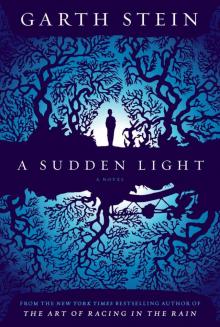 A Sudden Light
A Sudden Light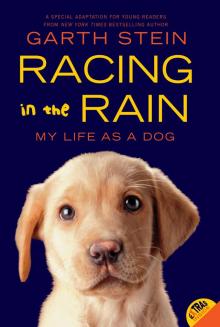 The Art of Racing in the Rain
The Art of Racing in the Rain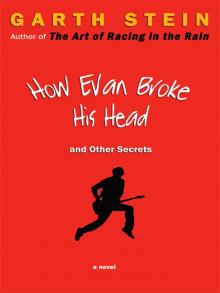 How Evan Broke His Head and Other Secrets
How Evan Broke His Head and Other Secrets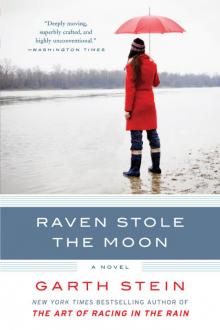 Raven Stole the Moon
Raven Stole the Moon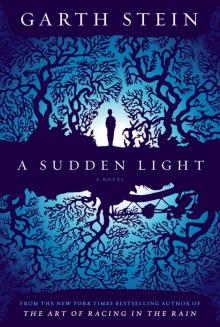 A Sudden Light: A Novel
A Sudden Light: A Novel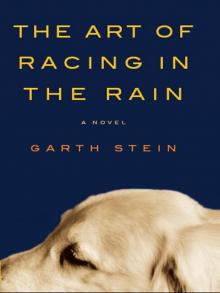 Art of Racing in the Rain, The
Art of Racing in the Rain, The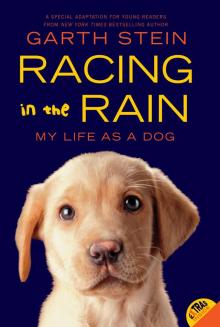 Racing in the Rain
Racing in the Rain